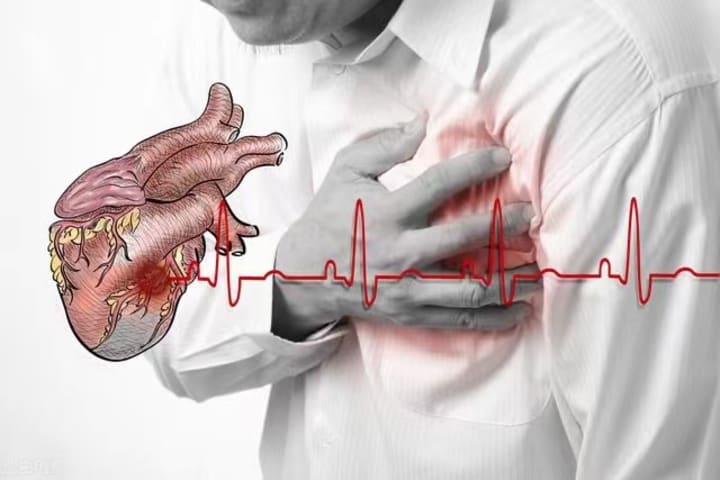The day turns cooler to induce acute heart failure
Early intervention of these warning signs can save lives

When you have been diagnosed with cardiovascular diseases, such as coronary heart disease, hypertension, arrhythmia, etc., do not have to be too nervous and talk about the tiger, but even more so, you should not be lucky and light. Because, if heart disease is not effectively treated and controlled, it may eventually lead to changes in the structure and function of the heart, causing heart enlargement, myocardial diastolic and systolic function to be weakened, and heart failure (heart failure) to occur.
Heart failure is not far away, as heart disease can affect heart function to a certain extent. Heart failure can be triggered or exacerbated by certain triggers, such as unusually cold winters, stressful or emotional changes, or exertion. For example, if a patient with hypertension has uncontrolled blood pressure in winter or if emotional stress induces a sharp increase in blood pressure, even if he or she has not had a heart failure attack before, he or she may suddenly experience breathlessness, chest tightness, or even coughing and pink frothy sputum, which should alert him or her to the occurrence of acute left heart failure.

Next, let's see what "warning signs" will be sent by "heart failure": 1.
1. palpitations, weakness, and shortness of breath: palpitations and shortness of breath, and easy fatigue are the most common symptoms of heart failure, and many heart patients will experience panic, weakness, and breathlessness during activities or after exertion. This is due to reduced contractile function of the heart, resulting in less blood being pumped out to muscles and tissues, as well as a faster heartbeat.
2. Dizziness and lightheartedness: Poor sleep, cervical dispositions, and hypertension may cause dizziness and lightheartedness. However, if the patient is dizzy and light-headed and also has significantly low blood pressure, it may be heart failure. Especially serious may also appear syncope, carcinogenic shock, and other life-threatening conditions, at this time should promptly seek medical attention.
Nocturnal dyspepsia: When lying down, heart failure patients may feel dyspepsia because of fluid accumulation in the lungs, which is relieved when sitting up.
4. Persistent cough and wheezing: Heart failure is often accompanied by a persistent cough and wheezing, with or without white or pink foamy sputum, or blood in the sputum, and the cough can be relieved or alleviated when sitting or standing. This is also a symptom caused by fluid accumulation in the lungs.
5. Edema: Swelling of the lower extremities or lower body parts is also a common symptom of heart failure. This is caused by heart failure resulting in the impaired return of body fluid to the periphery, which accumulates in the tissue spaces. For persistent swelling, or inexplicable weight gain (1-2 kg in 24 hours), prompt medical attention is also required.
6. Loss of appetite: Prolonged gastrointestinal stasis can cause loss of appetite, bloating, nausea, persistent feeling of fullness after eating, constipation, or diarrhea in cardiac patients without underlying gastrointestinal disease.
7. Anxiety: Especially in elderly heart failure patients, reduced cardiac output and hypoglycemia cause ischemia and asphyxia in brain tissue, which leads to symptoms such as reduced attention, apathy, anxiety, insomnia, drowsiness, and confusion, especially at night.
The above has sorted out the typical or insidious symptoms of heart failure for you. In clinical practice, many patients and family members do not correctly recognize the symptoms of heart failure in its early stages and miss the best time for treatment or believe that heart failure is an end-state and that it is a "tragic" end whether it is treated or not. Heart failure can be prevented and treated. Regarding the prevention of heart failure, the focus is on "early diagnosis and treatment". For people at high risk of heart failure, such as patients with hypertension, diabetes, coronary heart disease, and other cardiovascular diseases, it is important to diagnose and actively treat the primary heart disease as early as possible to slow down the process of the disease and the occurrence of heart failure. If a patient develops the above-mentioned warning symptoms during the treatment process, the patient should consider that heart failure may have occurred and should be seen in the hospital promptly to clarify the cause of heart failure, identify the causative factors of heart failure, and initiate standardized treatment of heart failure as early as possible to improve prognosis and quality of life.
The treatment of all diseases, while relying on professional treatment by doctors, actually requires the efforts of patients themselves. So to prevent heart failure, patients and their families need to do their best to do the following.
1. Maintain a healthy lifestyle: Maintaining a healthy lifestyle can effectively protect heart function and keep cardiovascular disease patients away from heart failure. In daily life, we should quit smoking and drinking; pay attention to strengthening exercise, moderate exercise can strengthen and improve heart function; diet should pay attention to balanced nutrition, suitable to eat low fat, high protein, vitamin and mineral-rich light food, and should do three meals in moderation, do not drink strong tea, coffee; ensure regular rest, sufficient sleep, avoid strain; emotional excitement is a major factor triggering heart failure, to keep the mood To maintain a happy mood, be calm and avoid mood swings as much as possible.
Prevent infection: Preventing infection can reduce the occurrence of heart failure, especially lung infection, which is one of the most common and important triggers of heart failure in patients with cardiovascular disease. During the cold weather or high incidence of influenza and new coronary, or cardiovascular disease patients should minimize going out, avoid going to crowded, confined public places, wear masks when going out, be hygienic, wash hands regularly, and avoid the occurrence of cold or influenza to prevent further lung infections.
3. Actively treat the primary disease: Actively treating the primary disease is the key to preventing the deterioration of heart function. People with cardiovascular disease should actively treat the primary disease and strictly follow the treatment plan and interventions formulated by the doctor for themselves for treatment and rehabilitation, not change medication or increase or decrease the dosage of medication at will, otherwise, it will not only affect the treatment effect but even aggravate the condition and lead to deterioration of heart function.
4. Adjust water and salt: Patients with heart failure should pay attention to monitoring body weight, fluid intake and output, and controlling salt intake. Adjust the dosage of diuretics at any time according to the swelling, try not to let edema appear, and do not appear with chest tightness and shortness of breath, and fatigue, once these symptoms or signs appear, we should promptly consult a doctor.

Finally, I would like to remind you that the sudden change of weather to cold is one of the most likely causes of acute heart failure. The cold can easily lead to myocardial ischemia and stimulate higher blood pressure, as well as lung infections caused by cold and flu. People with risk factors for heart failure should have regular checkups and go to the hospital immediately if any of these "warning signs" appear.
About the Creator
Husayko Reynold
Nothing was too hard for him-my laughter, my hunger, my stubbornness, my ramblings, everything.






Comments
There are no comments for this story
Be the first to respond and start the conversation.